|
|
|
Sort Order |
|
|
|
Items / Page
|
|
|
|
|
|
|
| Srl | Item |
| 1 |
ID:
098264
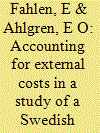

|
|
|
|
|
| Publication |
2010.
|
| Summary/Abstract |
Sweden has historically had strict emission control by implementation of economic policy instruments with the aim of internalising the external costs of air pollution. This study aims to evaluate how well current Swedish policy instruments reflect the environmental costs associated with heat generation in several district-heating (DH) plants in the DH system of Göteborg. Furthermore, it aims to simulate and evaluate the operation of the DH system based on its social cost-effectiveness which takes into account the DH system's private and external costs (non-internalised environmental costs). The study shows that the economic policy instruments do not fully internalise all external costs whereas for certain technologies, the costs in terms of taxes, emission permits, environmental fees, etc. are higher than the environmental costs caused by the pollutants, given the environmental cost estimates used in the study. The simulation results show that the deviating internalisation of external costs affects the economic ranking of the different plants within the studied DH system. The estimated loss in social-cost effectiveness of the operation of the DH system of Göteborg is noticable but relatively small if compared to the variable heat generation costs for most of the studied DH plants.
|
|
|
|
|
|
|
|
|
|
|
|
|
|
|
|
| 2 |
ID:
098560
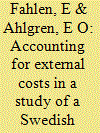

|
|
|
|
|
| Publication |
2010.
|
| Summary/Abstract |
Sweden has historically had strict emission control by implementation of economic policy instruments with the aim of internalising the external costs of air pollution. This study aims to evaluate how well current Swedish policy instruments reflect the environmental costs associated with heat generation in several district-heating (DH) plants in the DH system of Göteborg. Furthermore, it aims to simulate and evaluate the operation of the DH system based on its social cost-effectiveness which takes into account the DH system's private and external costs (non-internalised environmental costs). The study shows that the economic policy instruments do not fully internalise all external costs whereas for certain technologies, the costs in terms of taxes, emission permits, environmental fees, etc. are higher than the environmental costs caused by the pollutants, given the environmental cost estimates used in the study. The simulation results show that the deviating internalisation of external costs affects the economic ranking of the different plants within the studied DH system. The estimated loss in social-cost effectiveness of the operation of the DH system of Göteborg is noticable but relatively small if compared to the variable heat generation costs for most of the studied DH plants.
|
|
|
|
|
|
|
|
|
|
|
|
|
|
|
|
| 3 |
ID:
098576
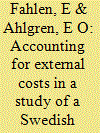

|
|
|
|
|
| Publication |
2010.
|
| Summary/Abstract |
Sweden has historically had strict emission control by implementation of economic policy instruments with the aim of internalising the external costs of air pollution. This study aims to evaluate how well current Swedish policy instruments reflect the environmental costs associated with heat generation in several district-heating (DH) plants in the DH system of Göteborg. Furthermore, it aims to simulate and evaluate the operation of the DH system based on its social cost-effectiveness which takes into account the DH system's private and external costs (non-internalised environmental costs). The study shows that the economic policy instruments do not fully internalise all external costs whereas for certain technologies, the costs in terms of taxes, emission permits, environmental fees, etc. are higher than the environmental costs caused by the pollutants, given the environmental cost estimates used in the study. The simulation results show that the deviating internalisation of external costs affects the economic ranking of the different plants within the studied DH system. The estimated loss in social-cost effectiveness of the operation of the DH system of Göteborg is noticable but relatively small if compared to the variable heat generation costs for most of the studied DH plants.
|
|
|
|
|
|
|
|
|
|
|
|
|
|
|
|
| 4 |
ID:
099298


|
|
|
|
|
| Publication |
2010.
|
| Summary/Abstract |
As global fuel reserves are depleted, alternative and more efficient forms of energy generation and delivery will be required. Combined heat and power with district heating (CHP-DH) provides an alternative energy production and delivery mechanism that is less resource intensive, more efficient and provides greater energy security than many popular alternatives. It will be shown that the economic viability of CHP-DH networks depends on several principles, namely (1) the optimisation of engineering and design principles; (2) organisational and regulatory frameworks; (3) financial and economic factors. It was found that in the long term DH is competitive with other energy supply and distribution technologies such as electricity and gas. However, in the short to medium term it is shown that economic risk, regulatory uncertainty and lock-in of existing technology are the most significant barriers to CHP-DH development. This research suggests that under the present regulatory and economic paradigm, the infrastructure required for DH networks remains financially prohibitive; the implementation of government policies are complicated and impose high transaction costs, while engineering solutions are frequently not implemented or economically optimised. If CHP-DH is going to play any part in meeting climate change targets then collaboration between public and private organisations will be required. It is clear from this analysis that strong local government involvement is therefore necessary for the co-ordination, leadership and infrastructural deployment of CHP-DH.
|
|
|
|
|
|
|
|
|
|
|
|
|
|
|
|
| 5 |
ID:
094224


|
|
|
|
|
| Publication |
2010.
|
| Summary/Abstract |
According to the US Energy Information Administration, space and hot water heating represented about 20% of total US energy demand in 2006. Given that most of this demand is met by burning natural gas, propane, and fuel oil, an enormous opportunity exists for directly utilizing indigenous geothermal energy as a cleaner, nearly emissions-free renewable alternative. Although the US is rich in geothermal energy resources, they have been frequently undervalued in America's portfolio of options as a means of offsetting fossil fuel emissions while providing a local, reliable energy source for communities. Currently, there are only 21 operating GDHS in the US with a capacity of about 100 MW thermal. Interviews with current US district heating operators were used to collect data on and analyze the development of these systems. This article presents the current structure of the US regulatory and market environment for GDHS along with a comparative study of district heating in Iceland where geothermal energy is extensively utilized. It goes on to review the barriers and enablers to utilizing geothermal district heating systems (GDHS) in the US for space and hot water heating and provides policy recommendations on how to advance this energy sector in the US.
|
|
|
|
|
|
|
|
|
|
|
|
|
|
|
|
| 6 |
ID:
093481
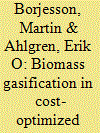

|
|
|
|
|
| Publication |
2010.
|
| Summary/Abstract |
Biomass integrated gasification combined cycle (BIGCC) plants could, in combined heat and power (CHP) generation, increase the power-to-heat ratio compared to conventional biomass steam turbine plants. Furthermore, biomass gasification could also be used for the efficient production of biofuels for transport. In this study, different applications of biomass gasification in connection to district heating (DH) are analysed and contrasted to conventional technology options. An application of the cost-optimizing energy system model MARKAL with a detailed description of the DH sector in a southwestern region of Sweden was developed within the study and used in the analysis. Policy measures for CO2 reduction and for promotion of "green" electricity are assumed, and required subsidy levels for large-scale production of transport biofuels are calculated. The model also operates with different supplies of biomass: a local supply at a lower cost and an international supply of refined biomass at a slightly higher cost. The study shows that investments in BIGCC CHP are often cost-efficient in cases with low ambitions regarding transport biofuels. However, due to limitations in heat demand and in local, lower cost, supply of biomass, investment in biofuel production means less investment in BIGCC CHP and, thereby, a smaller electricity production.
|
|
|
|
|
|
|
|
|
|
|
|
|
|
|
|
| 7 |
ID:
092749


|
|
|
|
|
| Publication |
2009.
|
| Summary/Abstract |
Biomass gasification with subsequent synthesis to liquid or gaseous biofuels generates heat possible to use in district heating (DH) systems. The purpose here is to estimate the heat sink capacity of DH systems in the individual EU nations and assess the possibilities for biomass-gasification-based co-generation of synthetic biofuels for transportation and heat (CBH) for DH systems in the EU countries. The possibilities are assessed (i) assuming different levels of competiveness relative to other heat supply options of CBH corresponding to the EU target for renewable energy for transportation for 2020 and (ii) assuming that the potential expansion of the DH systems by 2020 is met with CBH. In general, the size of the DH heat sinks represented by the existing national aggregated DH systems can accommodate CBH at a scale that is significant compared to the 2020 renewable transportation target. The possibilities for CBH also depend on its cost-competitiveness compared to, e.g., fossil-fuel-based CHP. The possible expansion of the DH systems by 2020 represents an important opportunity for CBH and is also influenced by the potential increase in the use of other heat supply options, such as, industrial waste heat, waste incineration, and CHP.
|
|
|
|
|
|
|
|
|
|
|
|
|
|
|
|
| 8 |
ID:
137721


|
|
|
|
|
| Summary/Abstract |
Approaches to ‘sustainability transitions’ stress the possibility of aligning actors around a shared vision of the future, e.g. at the scale of a city. Empirical accounts reveal how difficult such coordination often is due to contradictory views involved. How can we better understand related processes of searching and negotiation? What does this mean for the organization of decision making processes regarding long-term infrastructural change? We analyze a conflict which erupted in Freiburg, Germany when two strategies of reducing environmental impacts of space heating were to be applied in the Vauban ‘model district’: A) Efficient co-generation of heat and power (CHP) combined with district heating systems (DHS), and B) Reducing heat demand by low-energy designs and ambitious energy standards (‘passive house standard’). In order to understand the politics of infrastructure development, we unravel 1) enabling factors and driving forces of the conflict, 2) normative content of opposing viewpoints, 3) resources tapped into for settling the disagreement, and 4) the institutional setup of such decision making about energy policy priorities in the municipality. We reflect on implications of such a perspective on how policies and how governance arrangements should ideally be shaped and take a brief outlook on further research needed.
|
|
|
|
|
|
|
|
|
|
|
|
|
|
|
|
| 9 |
ID:
188555


|
|
|
|
|
| Summary/Abstract |
With expanding solar and wind power production, the topic of flexibility services attracts increased attention in the Swedish energy system. In this context, the potentials in using thermal storage capacities in district heating (DH) systems have been brought forward, primarily by academic scholars. Using a ‘grounded’ approach, this study investigates if professionals assigned to Swedish DH companies and electricity distribution system operators utilise, or plan to utilise, DH systems as flexibility services for the electricity grid. Original data was collected through semi-structured interviews, held with fourteen individuals affiliated to different actors in the Swedish energy system. These individuals were identified as being experts, or practically engaged, in using DH utilities as flexibility services for the electricity grid. The findings show that although technologies for coupling between DH systems and the electricity grid are already in place, initiatives for using DH systems as flexibility services for the electricity system are rare in Sweden. Coupling challenges stem from ownership and operation legislation frameworks, marginal incentives and a widespread focus on firm benefits rather than energy systems benefits. Identified initiatives for using DH systems for flexibility services are primarily run on a local scale, designed and propelled by small groups of engaged individuals.
|
|
|
|
|
|
|
|
|
|
|
|
|
|
|
|
| 10 |
ID:
150395


|
|
|
|
|
| Summary/Abstract |
This paper aims to investigate the cost efficiency of South Korea’s district heating (DH) system by using a variable cost function and cost-share equation. We employ a seemingly unrelated regression model, with quarterly time-series data from the Korea District Heating Corporation (KDHC)—a public utility that covers about 59% of the DH system market in South Korea—over the 1987–2011 period. The explanatory variables are price of labor, price of material, capital cost, and production level. The results indicate that economies of scale are present and statistically significant. Thus, expansion of its DH business would allow KDHC to obtain substantial economies of scale. According to our forecasts vis-à-vis scale economies, the KDHC will enjoy cost efficiency for some time yet. To ensure a socially efficient supply of DH, it is recommended that the KDHC expand its business proactively. With regard to informing policy or regulations, our empirical results could play a significant role in decision-making processes.
|
|
|
|
|
|
|
|
|
|
|
|
|
|
|
|
| 11 |
ID:
163531
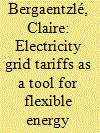

|
|
|
|
|
| Summary/Abstract |
Electricity grid tariffs are a lever for reinforcing the coupling of district heating systems to the electricity system and for activating flexibility from power-to-heat (P2H) technologies and storage capacities. This study assesses three tariffs that permit a flexible use of electric boilers in a representative district heating system in Denmark. A mixed integer programming model is developed to evaluate the impact of each tariff on district heating flexibility quantitatively. The tariffs are then discussed in the light of the regulatory requirements that network tariffs must comply with.
|
|
|
|
|
|
|
|
|
|
|
|
|
|
|
|
| 12 |
ID:
174966


|
|
|
|
|
| Summary/Abstract |
It is known that regulators and customers value stable prices in monopolised energy markets. The purpose of this paper is to investigate what factors influence local energy distributors to care about, and seek to implement, stable prices. Because the literature has suggested that ownership and political ideology affect monopoly pricing behaviour, we pay particular attention to ideological and ownership heterogeneity across a large number of local jurisdictions in Sweden. Specifically, this paper investigates two different pricing aspects; first, actual pricing behaviour in the unregulated Swedish district heating market and, second, survey data where the district heating firms report how important they think price stability is for their level of competitiveness. The results show that district heating firms that operate in municipalities with a left-wing government (i) implement actual prices that follow the long-term price path to a larger extent and (ii) state that smoothed prices are more important for their level of competitiveness. Results are both statistically and economically significant at conventional levels.
|
|
|
|
|
|
|
|
|
|
|
|
|
|
|
|
| 13 |
ID:
121312


|
|
|
|
|
| Publication |
2013.
|
| Summary/Abstract |
This paper proposes an artificial neural network (ANN) technique as a new approach to evaluate the energy input, losses, output, efficiency, and economic optimization of a geothermal district heating system (GDHS). By using ANN, an energetic analysis is evaluated on the Afyon geothermal district heating system (AGDHS) located in the city of Afyonkarahisar, Turkey. Promising results are obtained about the economic evaluation of that system. This has been used to determine if the existing system is operating at its optimal level, and will provide information about the optimal design and profitable operation of the system. The results of the study show that the ANN model used for the prediction of the energy performance of the AGDHS has good statistical performance values: a correlation coefficient of 0.9983 with minimum RMS and MAPE values. The total cost for the AGDHS is profitable when the PWF is higher than 7.9. However, the PWF of the AGDHS was found to be 1.43 for the given values. As a result, while installing a GDHS, one should take into account the influences of the PWF, ambient temperature and flow rate on the total costs of the system in any location where it is to be established.
|
|
|
|
|
|
|
|
|
|
|
|
|
|
|
|
| 14 |
ID:
137709
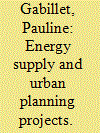

|
|
|
|
|
| Summary/Abstract |
Through the analysis of energy supply choices, this article explores the way in which energy priorities and their climate-related features are incorporated into urban public policy. These choices must take account of different factors, as is the case with district heating, which is justified as a vehicle of renewable energy while subject to pressure in eco-districts because its techno-economic balances are destabilised by falls in demand. Our study focuses particularly on the city of Metz (France), which has chosen district heating as the primary source for provision for the municipal area and for its first eco-district. We analyse the tensions within these choices, with particular attention to the way in which they are negotiated inside municipal departments and with the local energy operator. This enables us to explore the tensions in defining the scale that governs decisions and the linkages between energy-related and urban priorities.
|
|
|
|
|
|
|
|
|
|
|
|
|
|
|
|
| 15 |
ID:
133150
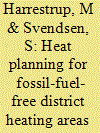

|
|
|
|
|
| Publication |
2014.
|
| Summary/Abstract |
The Danish government plans to make the Danish energy system to be completely free of fossil fuels by 2050 and that by 2035 the energy supply for buildings and electricity should be entirely based on renewable energy sources. To become independent from fossil fuels, it is necessary to reduce the energy consumption of the existing building stock, increase energy efficiency, and convert the present heat supply from fossil fuels to renewable energy sources. District heating is a sustainable way of providing space heating and domestic hot water to buildings in densely populated areas. This paper is a theoretical investigation of the district heating system in the Copenhagen area, in which heat conservation is related to the heat supply in buildings from an economic perspective. Supplying the existing building stock from low-temperature energy resources, e.g. geothermal heat, might lead to oversized heating plants that are too expensive to build in comparison with the potential energy savings in buildings. Long-term strategies for the existing building stock must ensure that costs are minimized and that investments in energy savings and new heating capacity are optimized and carried out at the right time.
|
|
|
|
|
|
|
|
|
|
|
|
|
|
|
|
| 16 |
ID:
191217
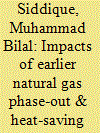

|
|
|
|
|
| Summary/Abstract |
Decarbonizing the district heating sector is essential for an affordable energy transition. Decarbonization strategies focusing on the interaction between power sector, individual heating technologies, heat-saving measures, and district heating expansion are missing in literature. We use energy system investment optimization to analyse the impact of decarbonization policies on district heating by comprehensively modelling the above-mentioned interaction across power and heating sector, and within the heating sector. We model decarbonization policy scenarios of massive investment into heat-saving measures and an earlier natural gas phase-out by 2030. Using Denmark as a case study, we identify policy-driven investments into heat-saving measures as non-optimal. Our results indicate that district heating expansion facilitates an earlier natural gas phase-out, which is a viable policy that inflicts only 0.07% extra system cost compared to a scenario with only net-zero emission targets. Furthermore, we find that decarbonized district heating sector has a very high reliance on industrial excess heat, biofuels, and electrification. A biomass tax reduces the high utilization of raw biomass and promotes its more sustainable use in carbon capture and storage. Our results show a cogeneration capacity reduction, which poses a challenge to the business model of conventional Danish district heating companies.
|
|
|
|
|
|
|
|
|
|
|
|
|
|
|
|
| 17 |
ID:
137720
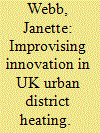

|
|
|
|
|
| Summary/Abstract |
Research on district heating has focused on technical-economic appraisal of its contribution to energy and carbon saving in urban centres. There is however lack of analysis of political and social processes which govern its actual take up. This paper examines these processes through a case study of Aberdeen, Scotland. Interviews and documentary analysis are used to examine the 2002 development of Aberdeen Heat and Power (AHP), an independent energy services company (ESCo). Technical-economic feasibility was a necessary component of appraisal, but not sufficient to govern decision-making. In the UK centralised energy market, DH investment is unattractive to commercial investors, and local authorities lack capacity and expertise in energy provision. In Aberdeen, the politics of fuel poverty converged with climate politics, creating an a-typical willingness to innovate through improvisation. The welfare priority resulted in creation of a non-profit locally-owned ESCo, using cost- rather than market-based heat tariffs. AHP has developed three combined heat and power energy centres and heat networks, supplying 34 MWh/pa of heat. Carbon savings are estimated to be 45% in comparison with electric heating, and heating costs are reduced by a similar amount. The conclusion outlines potential policy improvements.
|
|
|
|
|
|
|
|
|
|
|
|
|
|
|
|
| 18 |
ID:
116946


|
|
|
|
|
| Publication |
2012.
|
| Summary/Abstract |
Using industrial excess heat in District Heating (DH) networks reduces the need for primary energy and is considered efficient resource use. The conditions of Swedish DH markets are under political discussion in the Third Party Access (TPA) proposal, which would facilitate the delivery of firms' industrial excess heat to DH networks. This paper estimates and discusses the untapped potential for excess heat deliveries to DH networks and considers whether the realization of this potential would be affected by altered DH market conditions. The results identify untapped potential for industrial excess heat deliveries, and calculations based on estimated investment costs and revenues indicate that realizing the TPA proposal could enable profitable excess heat investments.
|
|
|
|
|
|
|
|
|
|
|
|
|
|
|
|
| 19 |
ID:
126839


|
|
|
|
|
| Publication |
2014.
|
| Summary/Abstract |
Scarcity or abundance of energy resources usually depends on physical and geographical conditions in the region. However, the energy flow in the region also depends on the efficient use of energy resources, the consumption rate of energy and the possibility to use local renewable and non-renewable energy resources. Production, distribution and the use of energy resources in the region are the challenges for central and local government, business and social service, customers and other stakeholders. Development of regional energy economy should be optimized according to the available energy flow in the region using a network system analysis method, which provides solutions for developing sustainable energy economy models. The network system analysis method enables to optimize the use of local and renewable resources at the regional level and reveals available local energy resources. An efficient use of available regional resources and the use of renewable energy sources (RES) should be the main goals for the development of regional energy system. RES can compete with traditional fossil fuel with the condition that all hidden aspects are revealed. The network system analysis method enables to indicate energy flows in the region as well as indicate pros and cons of using renewable energy technologies.
|
|
|
|
|
|
|
|
|
|
|
|
|
|
|
|
| 20 |
ID:
103627


|
|
|
|
|
| Publication |
2011.
|
| Summary/Abstract |
The purpose of this paper is to analyse the possible effects of introducing TPA in district heating networks by identifying and scrutinizing a number of possible scenarios for increased competition. The analysis builds on a theoretical discussion of economic efficiency in district heating operations, and the possible impacts on consumer prices of a market opening. An important conclusion is that regulated TPA may have small positive effects on competition, and at the same time it can have a negative impact on the possibility to run the integrated district heating operations in a cost-effective manner. This conclusion stems in part from the observation that most district heating networks are local in scope. Moreover, district heating operations are highly interdependent in, for instance, that the level of the return temperature of the water will affect the efficiency of combined heat and power plants. For these reasons, the introduction of the so-called single-buyer model or, perhaps even more preferable, an extended and more transparent producer market could represent more efficient market designs. Moreover, in networks with clear natural monopoly characteristics an ex ante price regulation must be considered.
|
|
|
|
|
|
|
|
|
|
|
|
|
|
|
|
|
|
|
|
|